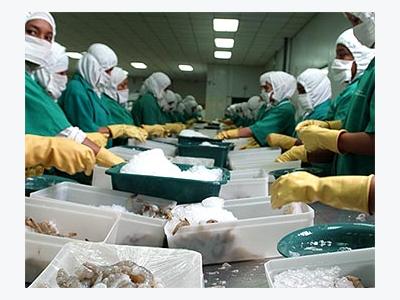Exports of Ecuadorian shrimp to Russia grow 90pc

Between January and November 2016, exports of Ecuadorian shrimp to Russia grew 90 per cent over the same period in 2015, according to a report from the Ecuadorian Trade Office in Moscow.
Shrimp processing plant. (Photo: Expalsa)
Updated statistics from the Russian Federal Customs Service indicate that in that period Russian shrimp imports from Ecuador amounted to USD 20.2 million, compared to around USD 10.6 million in 2015.
Anton Churakov, marketing manager for the Russian company Agama, which imports Ecuadorian shrimp, attributes this commercial growth to the problems of the last four years with the purchases of products from Southeast Asia.
Another advantage is the greater proximity of Ecuador, and the better quality of the Ecuadorian crustacean compared to the rival products of China and Vietnam.
Currently, Ecuador exports shrimp to more than 50 countries in the world - among them the United States, Vietnam, Spain, Italy and France - and obtains about USD 1.8 billion a year in revenues.
The Commercial Office of Ecuador in Moscow estimates that in Russia, it will soon be possible to even incorporate Ecuadorian shrimp into the menus of restaurants, as a product differentiated by its quality, as it does in other countries, where Ecuadorian shrimp is greatly appreciated.
The most common form of shrimp consumption in Russia is in snacks or entrees to accompany certain alcoholic beverages. It is also one of the main ingredients in the preparation of Asian cuisine dishes that are increasingly popular among Russians and it is also consumed with salads or grilled.
Có thể bạn quan tâm
 Aquaculture Producers Express Concern Over Dumping Proposal in Donegal Bay
Aquaculture Producers Express Concern Over Dumping Proposal in Donegal Bay Aquaculture producers and members of the Irish Farmers Association (IFA) have expressed serious concerns with a proposal published in December
 Russia to Further Cut Fish Imports With New Crimean Processing Plant
Russia to Further Cut Fish Imports With New Crimean Processing Plant A new fish processing facility is to be launched on the Crimean peninsula in late 2017, allowing Russia to replace up to 19 per cent of its fish imports.
 Cambodia Planning For First Large-Scale Marine Fish Farm
Cambodia Planning For First Large-Scale Marine Fish Farm A proposal for the country’s first large-scale marine fish farm that would raise grouper, sea bass and other valuable dinner-table species has been sent to the